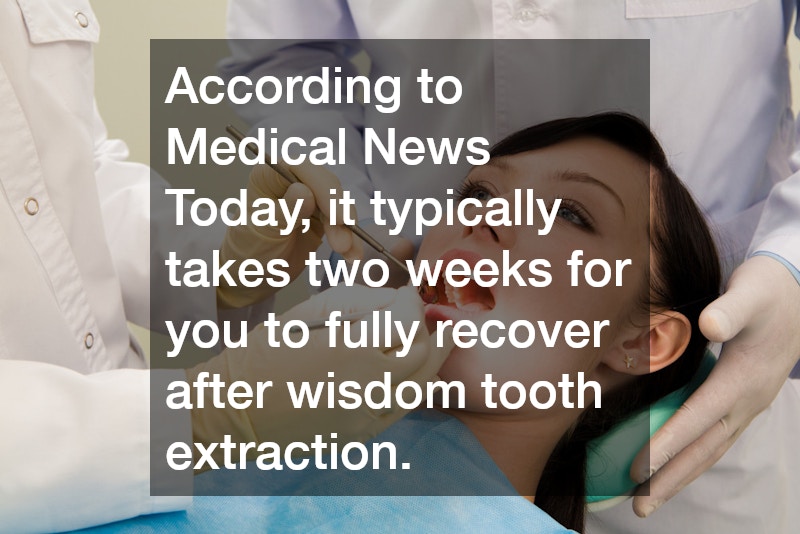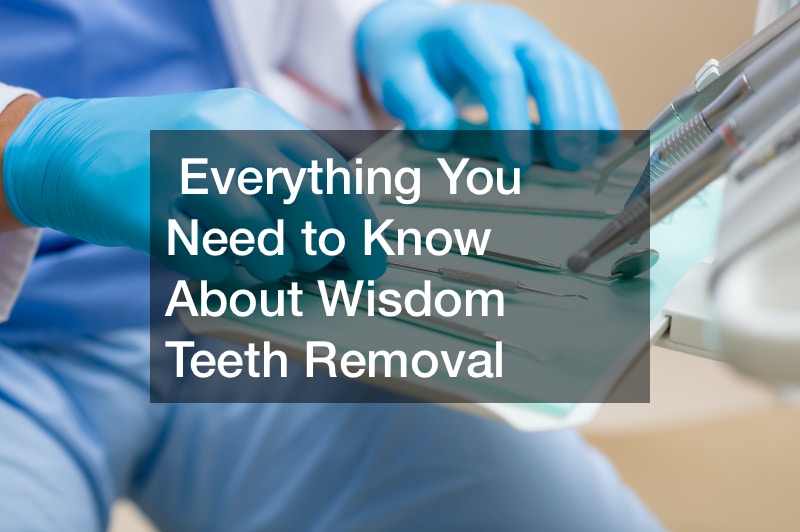
Booking your annual visit for dental care and cleaning is an essential part of maintaining good health. If your annual visit has resulted in being told that you need a wisdom tooth removed, you will typically need to go to an oral surgeon for that procedure. After the procedure is over, the dental team will give you a list of instructions about how to take care of yourself and about signs and symptoms which would mean you must call the dentist.

One set of symptoms to look for is signs of infection following wisdom tooth extraction.
According to WebMD, signs of infection from wisdom teeth removal can include pain and swelling at the site of removal. This pain will often feel as though it is traveling up your gumline. You might also experience a discharge of pus from wisdom teeth removal.

According to Medical News Today, it typically takes two weeks for you to fully recover after wisdom tooth extraction. During that period, many people find relief from pain and swelling by holding an ice pack on their cheek. If you still have swollen gums 2 weeks after extraction, you should contact your oral surgeon.

When you feel pain in your mouth, especially near your wisdom teeth, it may be time to have your wisdom teeth removed. According to the Mayo Clinic, the pain may be caused by a sideways tooth, as wisdom teeth sometimes grow in sideways. The pain can be so excruciating that you may begin looking for same day wisdom tooth removal. According to Ask the Dentist, you’ll need an extraction dentist or oral surgeon, as most general dentists aren’t able to remove wisdom teeth.
Once you make an appointment with the dentist service for wisdom tooth extraction, they will make sure you understand the procedure. Your extraction dentist will explain that the removal of your wisdom tooth will cause bone shrinkage in the tooth next to it. To prevent complications of bone shrinkage, your dentist may recommend a bone graft.

After the procedure is finished, the dental team will take you to a recovery area until your condition returns to normal. You may have pain and swollen gums after extraction procedures. The team in the recovery area will give you a list of instructions on how to care for yourself and when to call the dentist.
Updated 5/30/23
There may be certain instances that necessitate the removal of your teeth. Aside from accidents and injuries, other reasons for having your teeth extracted include overcrowding, gum disease, and severe tooth decay. The procedure takes place in a dental clinic under local anesthetic.
Although losing a tooth can be disturbing, there are some benefits of tooth extraction. You’ll be relieved of pain almost immediately. Getting rid of a decayed tooth protects the other teeth surrounding it and reduces the risk of spreading infection. Overcrowding causes misalignment. Removing a tooth can make way for straighter teeth. Wisdom teeth need removal if they affect your oral health.
Certain questions may arise when you’re getting a tooth removed. Can I chew gum after tooth extraction? Avoid gum and hard foods for a couple of days after removal to allow healing. Can I rinse my mouth after wisdom teeth removal? Rinse 24 hours after the procedure. Follow your dentist’s instructions. Can I take ibuprofen after wisdom tooth extraction? Yes, you can, unless certain health conditions prevent you from taking it. Let your dentist know this beforehand.
Always follow the dentist’s post-operative instructions to allow proper healing, and don’t miss your follow-up scheduled visit.
Over half of people have wisdom teeth. These teeth need to be removed, or they can cause the rest of your teeth to shift and get overcrowded in your mouth. Do I need to extract my wisdom teeth? If you have them, then they need to go. Sometimes wisdom teeth don’t hurt. Other times you might have excruciating pain in the wisdom tooth. If you don’t have pain, you might be able to wait a while for your wisdom tooth removal. But if you’re in pain, you need to go to a dental practice and get them removed as soon as possible.
While you might wonder does the hospital removes teeth, the answer is no. Your wisdom teeth will be removed at a dental practice. The effects of getting wisdom teeth removed should be relatively mild and short-lived. If you have anesthesia, you’ll need someone to drive you home, and you’ll need time for it to wear off. You will likely have some pain, but the dentist will give you medication for it. Wisdom tooth removal is minor surgery, so you should be recovered after only a little while.
It’s estimated that 35% of all people are born without wisdom teeth. That means about 65% of the population need their wisdom teeth pulled. This common oral surgery procedure is almost a rite of passage for young people. Anyone who needs wisdom tooth surgery is sure to have a lot of questions.
Do regular dentists remove wisdom teeth? They only do it if the wisdom tooth or teeth has erupted from the gums. For many people, their wisdom teeth are impacted, or lie completely under the gumline inside of the jawbone. Then the dentist who can remove wisdom teeth is an oral surgeon, because they are able to use IV anesthesia.
Do dentist put you to sleep for wisdom teeth? If you need a wisdom tooth pulled that has erupted from your gums, you do not need to go under anesthesia, unless you specifically go to a sedation dentist. You may not need to go under general anesthesia, but need nitrous oxide gas or an antianxiety pill.
Do they put you to sleep when removing wisdom teeth? If you have impacted wisdom teeth, then you do need to go to sleep. Although it is routine outpatient surgery, it’s still surgery. Because of the anesthesia, it is imperative to have someone drive you to and from the oral surgeon.

If only wisdom teeth really did make you wise. Unfortunately, the only thing they are good for is wrecking havoc on your other teeth by crowding your mouth and, if not removed by a family dentist, they can create trouble. A recent study showed that 74% of adults felt an unattractive smile could hurt their chances for career success, while nearly 96% believe a great smile makes you more appealing to the opposite sex.
Based on this knowledge, it is probably best to remove those unwanted (and unneeded) wisdom teeth. An oral surgeon, cosmetic surgeon, or family dentist can perform the removal procedure. Conduct an online dentist search to see what offices will do the surgery. Nearly 80% of dentists are general practitioners, while the rest are dental specialists who limit their practices to a single specialty area, so the more specialized the dentist is in wisdom tooth removal, the better.
The process: Your dentist will first give you a local anesthetic at the area where they will remove the tooth. However, you can opt for sedation dentistry if you do not want to be conscious for the procedure or you need to be more relaxed. Any general family dentistry office should be able to provide sedation.
Once you are sedated, the dentist will open up the gum tissue covering the wisdom tooth and remove the bone and the root. If the wisdom teeth are fully developed, the dentist may need to cut the tooth into smaller pieces for easier removal.
After the tooth is removed and depending on the size of the incision, you may need stitches — which will most likely be dissolvable. You will then resemble a chipmunk when cotton gauze pads are placed over the wound to stop the bleeding.
After surgery: Most people will recover after a few days. Your dentist will also be sure to prescribe you painkillers if you have swelling. Some tips to help you recover include:
- Biting gently on gauze to stop the bleeding. Change them if they become saturated with blood.
- Try not to accidentally (or intentionally) bite your tongue , cheek, or lips if your mouth is still numb.
- Do not undergo any strenuous physical activity.
- Eat soft foods, but make sure to not use a straw!
- Use the saline solution given to you by your dentist in order to clean the holes, do not brush the blood clot away.
- Prevent your tongue from rubbing over the area, this could cause bleeding and delay the healing process.

Why is this procedure needed? Removing your wisdom teeth can prevent overcrowding in the back of your mouth, stop a wisdom tooth from becoming stuck in your jaw, and can prevent gum disease and tooth decay.
Consult your dentist at a routine checkup to see if you will eventually need these teeth removed. Get more info here.



